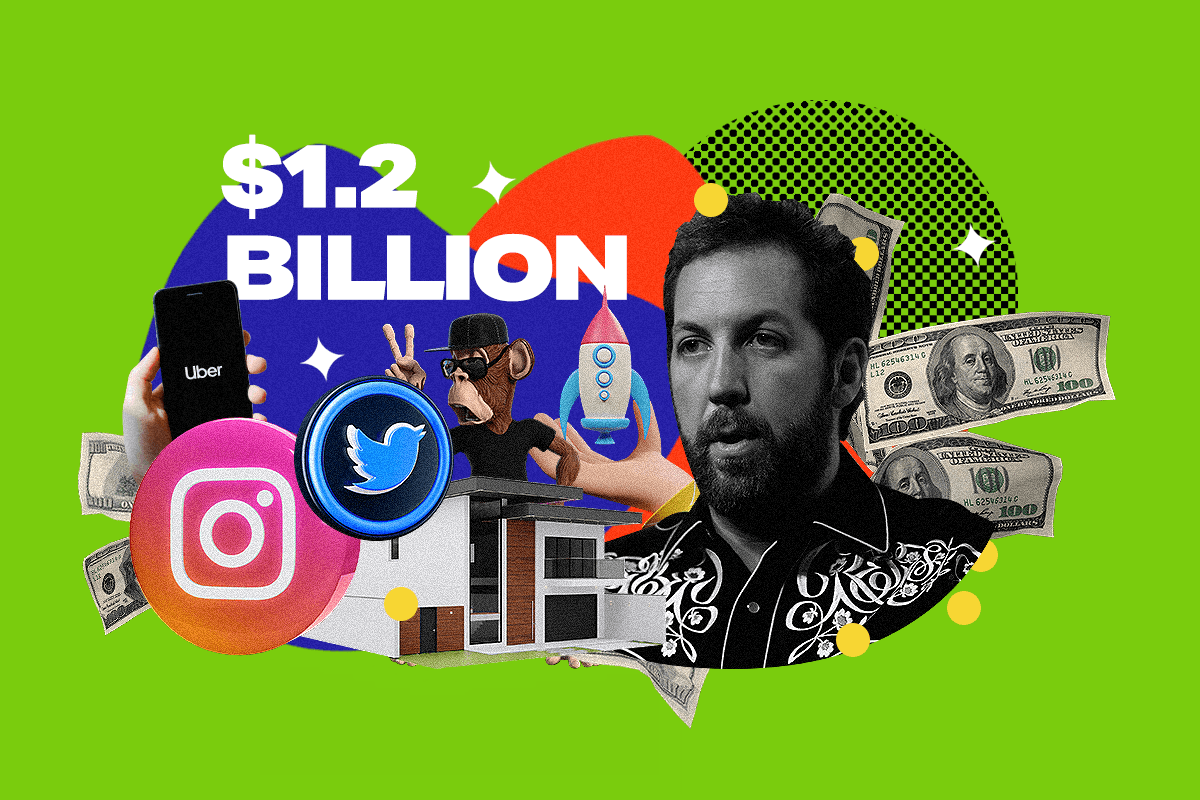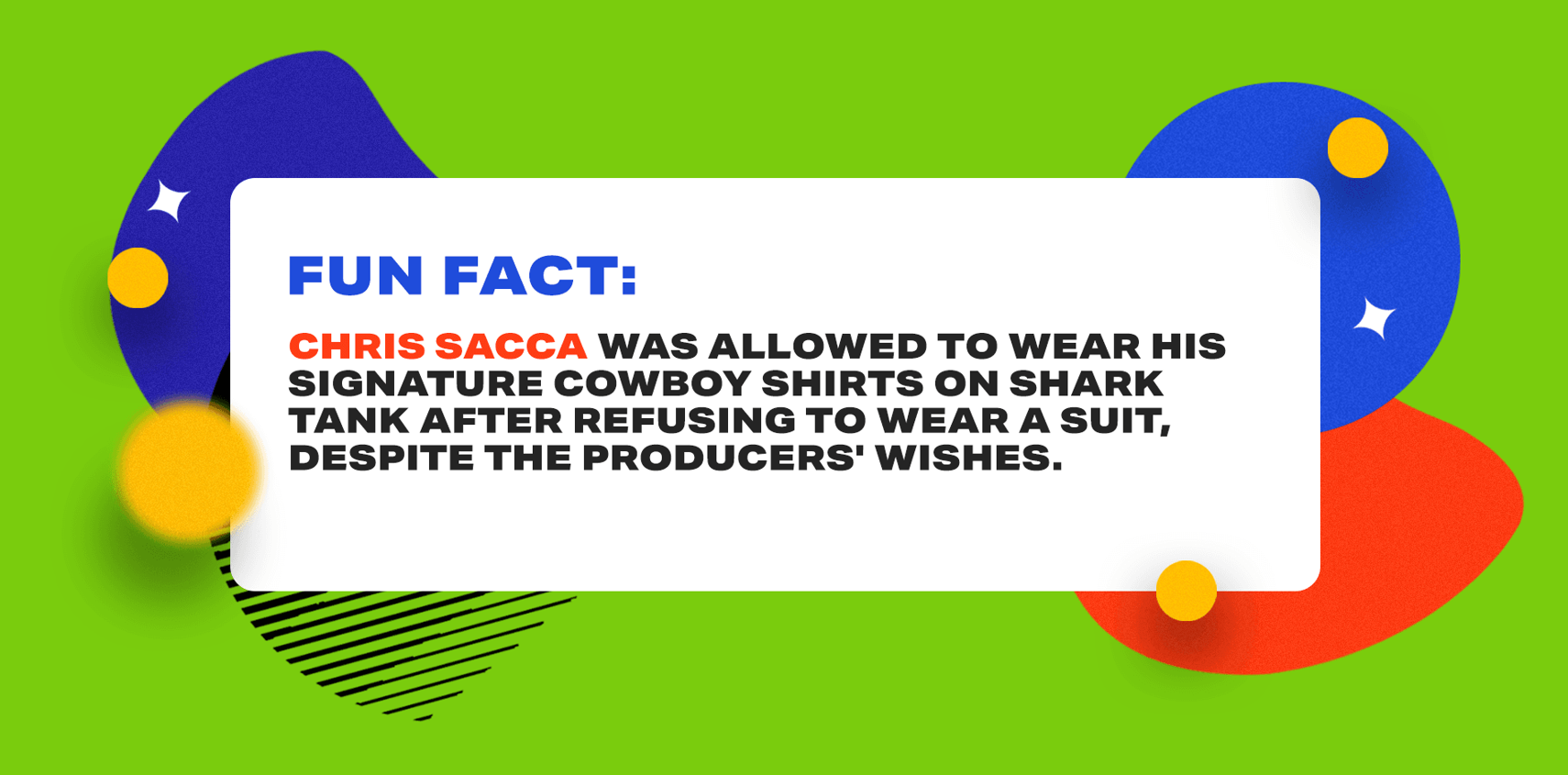Rich Dudes│Unpacking Chris Sacca’s Billion-Dollar Net Worth
Chris Sacca’s net worth is over $1 billion thanks to the venture capitalist’s successful investing in tech startups.

Chris Sacca is an American entrepreneur, investor, and venture capitalist whose financial acumen has earned him a net worth of more than $1 billion. As the founder of Lowercase Capital, Sacca invested in some of the world’s most successful technology companies like Twitter, Uber, Docker, and Kickstarter.
Chris Sacca has invested in over 40 startups, committing more than $214 million between 2006 and 2021.
Sacca’s extensive background also includes stints as the Head of Special Initiatives at Google and associate at Fenwick & West—where he handled venture capital, mergers, and acquisitions—before co-founding MIT Enterprise Forum Global.
Here’s the inside scoop on how Chris Sacca made his fortune—and where all that money goes.
Chris Sacca net worth at a glance:
| Net worth | $1.2 billion |
| Born | May 12, 1975 |
| Nationality | American born in Lockport, New York |
| Became a millionaire at | 25 |
| Occupations | Venture capitalist, angel investor, lawyer |
| Sources of wealth | Lowercase Capital, Twitter, Uber, Instagram, Docker, Twilio, Stripe, Kickstarter, Blue Bottle Coffee |
| Asset classes | Startups, real estate, stocks, & crypto |

How did Chris Sacca make his money?
Born May 12, 1975, to Katherine and Gerald Sacca in Lockport, New York, Christopher Sacca attended Georgetown University when her became a member of The Tax Lawyer law review.
After graduating from The Edmund A. Walsh School of Foreign Service, he rose to prominence in 2017 as one of the youngest members of the Forbes “Midas List” and went on to appear on television programs like Shark Tank and Alex, Inc.
The bulk of Chris Sacca’s fortune came from venture investing in tech startups. He amassed first-hand sector knowledge while working in Silicon Valley as a lawyer and in corporate finance.
In the late 1990s, while studying at Georgetown University Law Center, Sacca began trading stocks and turned less than $20,000 into $12 million by simply discovering a technical flaw in an online trading broker software.
Unfortunately, his success was short-lived as the dot-com bubble crash in 2000 wiped out his investment—leaving him with a four million-dollar negative balance.
Determined to rebuild, Sacca moved to Silicon Valley and worked at the law firm Fenwick & West. His time there gave him insight into how venture capital deals, mergers, and acquisitions work.
Next, Sacca worked at Speedera Networks, a digital media company, before pivoting to Google as Corporate Counsel where he studied fledgling startups.
Chris became a full-time angel investor in 2006 after leaving Google—starting with the seed rounds of Photobucket and Twitter. His investments in the former paid off after News Corp acquired Photobucket for $250 million. And Twitter became a successful global social media company before getting acquired by fellow rich dude Elon Musk.
In 2010, he teamed up with his wife Crystal to launch Lowercase Capital, one of the most successful venture capital funds in history. Through it, Sacca invested in Uber Technologies Inc., Instagram, Twilio, Stripe, and Kickstarter—which made him a billionaire. Though he retired in 2017, Sacca keeps busy with projects that are focused on climate change solutions.

How does Chris Sacca invest his money?
Real estate investor, Chris Sacca, is the definition of success. He has financed several startups, ranging from early stage to late growth, including the ‘unicorns’ like Docker and Lookout, which is worth $282 million. But Sacca isn’t out of touch with the real world. He has multiple real estate investments in Manhattan Beach and Truckee, California.
Sacca also puts his hard-earned money to good use. He recently allocated $350 million to tackle climate change, fueled by a passion for nuclear fusion and carbon removal.

Startups
Chris Sacca has invested in over 40 startups, committing more than $214 million between 2006 and 2021. His portfolio also includes 13 late growth-stage companies and a reported valuation of $921.9 million.
Sacca invested $50 million in Simulate, a pea protein technology startup, now valued at $260 million. Other notable companies in his portfolio include:
- Kickstarter
- CoverTechnologies
- TerraTrue
- Gumroad
- StyleSeat
- Brightwheel
- Streak
- Medium
- Swayable
- Liftopia
- Photobucket
- AdGrok
- The Happy Home Company
- Rent Like a Champion
- Recordsetter
- FanBridge
- Dailybooth
- GroupSpaces
Together, those companies gulped a combined $214 million of his money.
Sacca’s contribution towards environmental sustainability further illustrates his remarkable investment goals—allocating $350 million to tackle climate change by developing solutions such as nuclear fusion and carbon removal.
U.S. startup investments plummeted to their lowest level since 2020, while African startups saw their highest activity since 2021. Despite the overall decrease, acquisitions remain above 2020 levels, signaling investor optimism in the industry.
Late-stage tech in the retail, finance, and health sectors saw considerable funding drops. However, crypto and web3 startups saw significant investment, though the segment was down to less than a fourth of its 2021 funding peak.
Global venture capital investments decreased overall in 2021, but one notable exception was the fintech market, where investments soared to $131.5 billion—a 267% increase from the $49 billion invested in 2020. In the second quarter of 2022, startup funding fell 23% compared to the previous quarter—less than the 35% drop at the start of the year.
In 2022, venture funding dropped 35% from its 2021 peak of $681 billion to $445 billion, according to Crunchbase data. Seed funding also dropped 35% while early-stage and late-stage funding staggered by 54% and 64%, respectively.
The data indicates that global investments in the fintech industry remains strong, with total investment for the decade surpassing a trillion dollars. The investment downshift in the second quarter of 2022 is not as steep as in 2020.
These trends, combined with increased activity in the African market and the return of down rounds in private venture capital markets, mean that venture capitalists are ready to reinvest in startups.
An environment ripe for new investments poses a potentially lucrative future for venture capitalists like Sacca.

Real estate
Chris Sacca has invested over $20 million in properties on the east coast and California. These include two properties in Manhattan Beach, California, that he purchased in 2011 and 2014 for a respective $5.2 million and $4.1 million.
In 2013, the Weeks Family Foundation scholar bought a Mediterranean villa in the South Bay of Los Angeles for $6.3 million. Sacca then spent $1.1 million in December 2014 on a 3,400-square-foot house on La Costa Beach near San Diego.
Additionally, he has a cabin in Truckee, California, that cost him $415,000 situated next to a house he bought in 2009 for $631,000. He invested a total of $1,046,000 in the Truckee compound.
Global commercial real estate investment volumes are anticipated to increase by six to seven percent in 2023, according to a report by Knight Frank, due to a rise in private capital and increased infrastructure investments.
The report also projected a ten percent drop in United Kingdom house prices over the next two years, with a five percent decrease in 2023. As such, the global real estate investment outlook for 2023 is mixed, yet that can play into the hands of opportunistic investors who can navigate those risks.
Crypto
Chris Sacca invests in a “broad basket” of cryptos ranging from Bitcoin and Ethereum to “shitcoin lottery tickets.” In March 2014, he bought Bitcoin at $800. While Sacca believes cryptos and non-fungible tokens (NFTs) are cool assets, he warns against trading with borrowed money.

Source: finance.yahoo.com
October’s Avraham Eisenberg attack of $117 million is the most noteworthy example of exploitation and hacking in crypto. Not leaving out BlockFi, Genesis, Celsius and the FTX exchange—which all filed for bankruptcy between in 2022—highlighting the direness of the industry.
However, the outlook on web3 appears positive as major companies are investing in NFTs, institutional investors increase their allocations to blue-chip tokens, and regulatory reform offers potential influxes from both the retail and institutional sides.
Chris Sacca’s investing quotes
1. Ideas are nothing without the right team

2. Invest for the future

3. Hope for the best, but expect the worst

